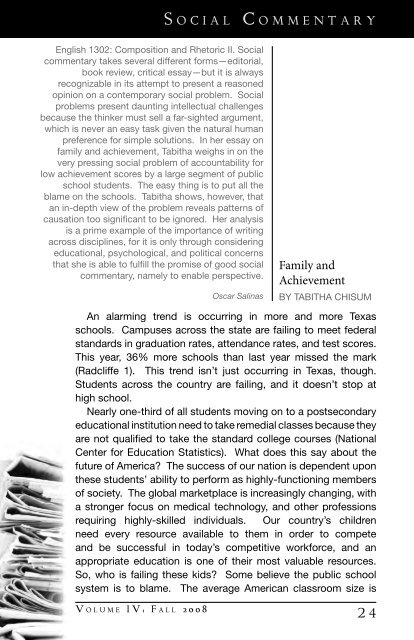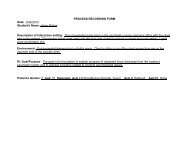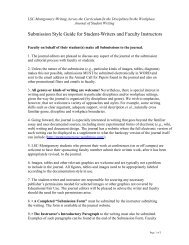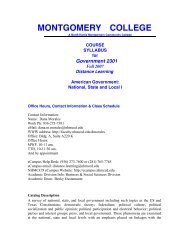2008 - Communication Across the Curriculum (CAC)
2008 - Communication Across the Curriculum (CAC)
2008 - Communication Across the Curriculum (CAC)
Create successful ePaper yourself
Turn your PDF publications into a flip-book with our unique Google optimized e-Paper software.
English 1302: Composition and Rhetoric II. Social<br />
commentary takes several different forms—editorial,<br />
book review, critical essay—but it is always<br />
recognizable in its attempt to present a reasoned<br />
opinion on a contemporary social problem. Social<br />
problems present daunting intellectual challenges<br />
because <strong>the</strong> thinker must sell a far-sighted argument,<br />
which is never an easy task given <strong>the</strong> natural human<br />
preference for simple solutions. In her essay on<br />
family and achievement, Tabitha weighs in on <strong>the</strong><br />
very pressing social problem of accountability for<br />
low achievement scores by a large segment of public<br />
school students. The easy thing is to put all <strong>the</strong><br />
blame on <strong>the</strong> schools. Tabitha shows, however, that<br />
an in-depth view of <strong>the</strong> problem reveals patterns of<br />
causation too significant to be ignored. Her analysis<br />
is a prime example of <strong>the</strong> importance of writing<br />
across disciplines, for it is only through considering<br />
educational, psychological, and political concerns<br />
that she is able to fulfill <strong>the</strong> promise of good social<br />
commentary, namely to enable perspective.<br />
V o l u m e I V : F a l l 2 0 0 8<br />
S o c i a l C o m m e n t a r y<br />
Oscar Salinas<br />
Family and<br />
Achievement<br />
by Tabitha Chisum<br />
An alarming trend is occurring in more and more Texas<br />
schools. Campuses across <strong>the</strong> state are failing to meet federal<br />
standards in graduation rates, attendance rates, and test scores.<br />
This year, 36% more schools than last year missed <strong>the</strong> mark<br />
(Radcliffe 1). This trend isn’t just occurring in Texas, though.<br />
Students across <strong>the</strong> country are failing, and it doesn’t stop at<br />
high school.<br />
Nearly one-third of all students moving on to a postsecondary<br />
educational institution need to take remedial classes because <strong>the</strong>y<br />
are not qualified to take <strong>the</strong> standard college courses (National<br />
Center for Education Statistics). What does this say about <strong>the</strong><br />
future of America The success of our nation is dependent upon<br />
<strong>the</strong>se students’ ability to perform as highly-functioning members<br />
of society. The global marketplace is increasingly changing, with<br />
a stronger focus on medical technology, and o<strong>the</strong>r professions<br />
requiring highly-skilled individuals. Our country’s children<br />
need every resource available to <strong>the</strong>m in order to compete<br />
and be successful in today’s competitive workforce, and an<br />
appropriate education is one of <strong>the</strong>ir most valuable resources.<br />
So, who is failing <strong>the</strong>se kids Some believe <strong>the</strong> public school<br />
system is to blame. The average American classroom size is<br />
2 4






